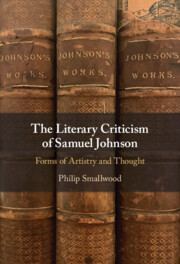The Literary Criticism of Samuel Johnson
For Samuel Johnson, poetical judgments were no mere exercise in dry evaluation; rather, they reflected deep emotional responsiveness. In this provocative study, Philip Smallwood argues for experiencing Johnson’s critical texts as artworks in their own right. The criticism, he suggests, often springs from emotional sources of great personal intensity and depth, inspiring translation of criticism into poetry and channelling prose’s poetic potential. Through consideration of other critics, Smallwood highlights singularities in Johnson’s judgments and approach, showing how such judgments are irreducible to philosophical doctrines. “Ideas,” otherwise the material of criticism’s propensity to systems and theories, exist for Johnson as feelings that “slumber in the heart.” Revealing Johnson’s humor and intellectual reach, Smallwood frames his criticism in unresolved ironies of time and forms of historical change. This title is part of the Flip it Open Programme and may also be available Open Access. Check our website Cambridge Core for details.
Philip Smallwood is Emeritus Professor of English at Birmingham City University. He has written widely about Johnson’s criticism and has lectured on his work internationally. Previous books include Johnson Re-Visioned (2001) and Johnson’s Critical Presence (2004), which won the Choice “Outstanding Academic Title” Award for 2005. This was followed by Critical Occasions (2011), his study of eighteenth-century critical history.
